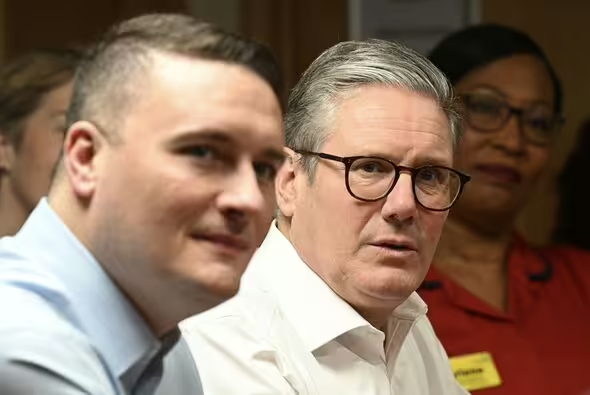Junior doctors have humiliated Labour after voting to strike just 10 months after being handed a whopping 22% pay rise. Their trade union, the British Medical Association, announced this morning that 90% of junior doctors voted in favour of strike action on a turnout of 55%.
The union is yet to confirm when strikes will commence, and insisted the Government can still avert NHS chaos by caving in to their latest demands. Junior doctors are calling for another huge pay rise of around 29%, which would restore their pay to 2008 levels when adjusted for inflation. Health Secretary Wes Streeting handed them 5.5% this year, the highest in the public sector.

Wes Streeting has been snubbed by his union friends (Image: Getty)
The BMA denounced this generosity as “derisory” and “woefully inadequate”.
Today’s strike ballot outcome could blow a hole in Labour’s promises to cut waiting lists and the NHS backlog, a central plank of its manifesto.
Dr Melissa Ryan and Dr Ross Nieuwoudt, co-chairs of the BMA’s resident doctors committee, said: “Doctors have spoken and spoken clearly: they won’t accept that they are worth a fifth less than they were in 2008. Our pay may have declined but our will to fight remains strong.”
“We now find ourselves at a crucial crossroads. Last year when in opposition Mr Streeting said that the solution to strikes was to talk to resident doctors. It was as true then as it is now. He made a point of acting quickly to grasp the issue and negotiate a solution. Only a few weeks ago he again said he wanted to get back round the table with us.
“Now we will see if he can once again make the right decision. He needs to come forward as soon as possible with a credible path to pay restoration. All we need is a credible pay offer and nobody need strike.”

Junior doctors will walk out between now and new year (Image: Getty)
“Doctors don’t take industrial action lightly, but they know it is preferable to watching their profession wither away. The next move is the Government’s. Will it repeat the mistakes of its predecessor? Or will it do the right thing and negotiate a path to full pay restoration and the restoration of doctors’ confidence in our profession’s future?”
Junior doctors took 44 days of strikes in 2023 and 2024, resulting in 1.5 million cancelled appointments and operations.
A Department for Health and Social Care spokesman fumed: “While most resident doctors in the BMA did not vote to strike, it is disappointing that the BMA is continuing to threaten strike action after a pay rise of 28.9% over the last three years.”
“The Secretary of State has been clear that he wants to work constructively with all unions, including the BMA, to improve working conditions for NHS staff and avoid strike action, which can be hugely disruptive for patients.”
A spokesman for Keir Starmer added that the Government will not be reopening pay negotiations with the BMA, warning: “Strikes will have extremely serious consequences.”
He added: “The NHS is finally moving in the right direction for the first time in 15 years so it’s disappointing that the BMA is undermining that progress with the threat of strikes.”
Danny Mortimer, the chief executive of NHS Employers, said: “NHS leaders do not want to see more industrial action by doctors, which could lead, once again, to thousands of appointments and operations being cancelled, as ultimately it’s the patients that suffer most.”
“Any decision by resident doctors to strike again after their recent pay awards would be a worrying step in the wrong direction, particularly given the BMA approach to strikes.
“Health leaders do understand that resident doctors have genuine concerns with regards to both the conditions they work in and training they receive. They recognise the work they need to do to better support and value resident doctors, and support the national work being undertaken to improve doctors’ experience of training and career pathways.
“However, we would urge BMA members to engage with the direction of travel the government has recently outlined in its ten-year health plan and work with trusts and the wider NHS to deliver the improvements to the working conditions of resident doctors that have previously been agreed.”

